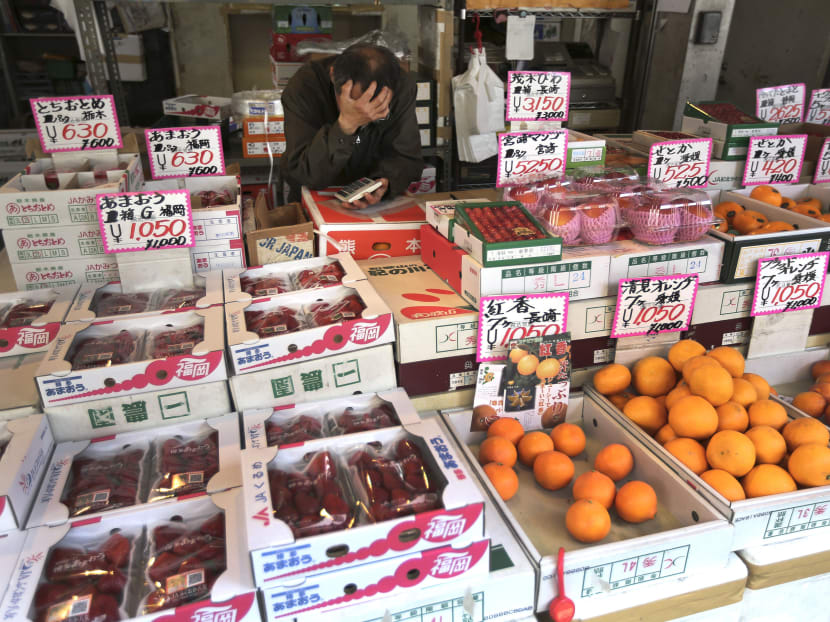Japan food import restrictions eased: AVA
SINGAPORE — The restrictions of food imported from Japan, including food from Fukushima prefecture, is being eased, the Agri-Food & Veterinary Authority of Singapore (AVA) announced today (May 31) in a statement. The easing of restrictions will take place with immediate effect.

In this March 28, 2014 file photo, a fruits shop clerk waits for customers at Tsukiji fish market in Tokyo. Photo: AP
SINGAPORE — The restrictions of food imported from Japan, including food from Fukushima prefecture, is being eased, the Agri-Food & Veterinary Authority of Singapore (AVA) announced today (May 31) in a statement. The easing of restrictions will take place with immediate effect.
The announcement was first made by Singapore Prime Minister Lee Hsien Loong during a joint press conference with Japan Prime Minister Shinzo Abe today.
The AVA said that fruits and vegetables, milk and milk products, meat, hen eggs and green tea and green tea products from 8 prefectures can be imported into Singapore without the need for pre-export tests. The prefectures are Chiba, Ibaraki, Gunma, Kanagawa, Saitama, Shizuoka, Tochigi and Tokyo.
The suspension of agricultural produce and processed food products from Fukushima prefecture will be lifted. These include fruits and vegetables, milk and milk products, meat, green tea and green tea products, and rice.
All food products from Japan will still require a Certificate of Origin to identify the prefecture of origin of the food product, said the AVA.
“AVA has been monitoring food imports from Japan closely since the Fukushima Nuclear Power Plant incident in 2011, and our surveillance results have been satisfactory,” said the AVA in the statement. “Japan’s surveillance results have also shown that radioactive contamination in food is very low. This is supported by AVA’s on-site assessment early this year to verify and understand Japan’s food safety measures.”
The AVA would also like to assure the public that food imported from Japan that is available in the market is safe for consumption. It added that it will continue to monitor food imports from Japan to ensure that the imports comply with Singapore’s food safety requirements.
Below is the AVA’s statement in full:
AVA eases restrictions on import of food from Japan
As announced by Singapore Prime Minister Lee Hsien Loong during a joint press conference with Japan Prime Minister Shinzo Abe, the Agri-Food & Veterinary Authority of Singapore (AVA) is easing restrictions on food imports from Japan, including Fukushima prefecture with immediate effect. AVA and the Japanese authorities will be working on the implementation details. The announcement comes after AVA’s review and on-site assessment, as well as satisfactory surveillance results from Japan and AVA.
AVA has been monitoring food imports from Japan closely since the Fukushima Nuclear Power Plant incident in 2011, and our surveilla nce results have been satisfactory. Japan’s surveillance results have also shown that radioactive contamination in food is very low. This is supported by AVA’s on-site assessment early this year to verify and understand Japan’s food safety measures.
EASING OF RESTRICTIONS
With this easing of restrictions, fruits and vegetables, milk/milk products, meat, hen eggs and green tea/green tea products from 8 prefectures (Chiba, Ibaraki, Gunma, Kanagawa, Saitama, Shizuoka, Tochigi and Tokyo) can be imported into Singapore without the need for pre-export tests.
In addition, the suspension of agricultural produce and processed food products (fruits and vegetables, milk/milk products, meat, green tea and green tea products, and rice) from Fukushima will be lifted.
However, the Japanese authorities need to show evidence of satisfactory surveillance results for radioactive contamination in these prefectures.
REMAINING RESTRICTIONS
Import restrictions that remain in place are:
a) Seafood and products from the forest from the prefectures of Ibaraki, Tochigi, Gunma will still require pre-export tests;
b) Seafood and products from the forest as well as a gricultural produce from demarcated areas and the control zone (close to the nuclear power plant) in Fukushima prefecture are not allowed to be imported.
All food products from Japan still require a Certificate of Origin (COO) to identify the prefecture of origin of the food product.
FOOD FROM JAPAN IS SAFE FOR CONSUMPTION
AVA will continue to closely monitor food imports from Japan to ensure that they comply with our food safety requirements.
We would like to assure the public that food imported from Japan that is available in the market is safe for consumption.
Issued by the Agri-Food and Veterinary Authority of Singapore On 31 May 2014.






